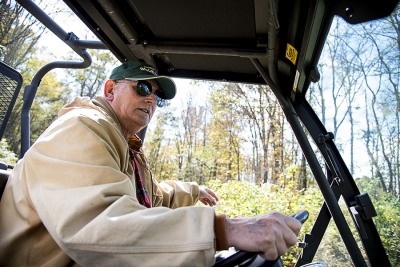SELC challenges Atlantic Coast Pipeline route
Robbie Koontz pulls on a ballcap as she sits to talk. Her hair is falling out and she’s a little embarrassed.
“My doctor says it is due to stress,” she said. “It is just constant. We can’t get away from it.”
The stress is over Dominion Virginia Power’s plans to route the proposed Atlantic Coast Pipeline right through her historic 1,200-acre farm.
She and her husband bought the Bath County property as a retirement home, and protected it by putting it into a conservation easement. It’s where Bob Koontz came to recover from cancer. And it is where they both would like to be buried, in the family cemetery they’ve created on a bluff overlooking the land.
“But now,” Bob says, “I’m afraid Dominion will dig us up and throw us out.”
The Koontzes are among several landowners who have found out their state-sponsored conservation easements made no difference to Dominion. After the U.S. Forest Service rejected Dominion’s first route, the utility then veered the path through at least 10 protected properties, like the Koontzes’.
On Thursday, SELC filed a motion with the Federal Energy Regulatory Commission to reject Dominion’s latest route, saying state law doesn’t allow this, and that Dominion’s maneuver shakes confidence in one of the state’s most successful conservation programs.
“When the U.S. Forest Service rejected Dominion’s original route for the Atlantic Coast Pipeline earlier this year, Dominion wasn’t about to let go of a project that promises to be very lucrative for its shareholders,” said Senior Attorney Greg Buppert. “Instead, they turned around and proposed an equally destructive route that would require an unprecedented diminishment of valuable conservation easement land.”
“Now I am afraid Dominion will dig us up and throw us out.”
The challenge centers on the “conservation easement” program administered by the Virginia Outdoors Foundation. Landowners can place large rural parcels into the easement program to prevent future development.
But Dominion Virginia Power’s re-drawn route has left easement donors feeling betrayed.
“This property survived the French and Indian War, the Civil War, world wars, all sorts of things,” Robbie Koontz said. “And now to see it destroyed by Dominion is really unbelievable.”
When a protected property like this is used for development, the change in status is called a “conversion.” Since the conservation easement program was started in 1966, only 13 properties have been “converted.” All were for small projects, like for a school’s turning lane and a town’s water tank.

“That was something we wanted to give to the people of Virginia. We wanted it to be looked after. That was our gift. We didn’t want it broken up into little parcels.”
Dominion’s request to convert at least 10 protected properties is “unprecedented,” Buppert says.
He also says it doesn’t comply with state law.
Virginia law requires these conversions to be essential to the county or locality where the property is located and in accordance with that locality’s comprehensive plan. In this case, Buppert says, not only is the pipeline not essential, but it does not even benefit the counties of Bath, Highland, Augusta and Nelson. The pipeline’s natural gas would be destined for other areas, not the areas where the property is being converted.
“The conservation easements threatened by the Atlantic Coast Pipeline play such a vital role in this region,” said Kate Wofford, executive director of the Shenandoah Valley Network. “They protect intact forestland, water quality, scenic views, and rare cave habitat—and they help to preserve the unique rural character of this extraordinary place. Landowners who have voluntarily placed their property under conservation easements trust that the land they love will be protected in perpetuity.”
Wofford says landowners may stop putting their wilderness properties into conservation easements if this is what will become of them.
Numerous landowners have expressed precisely that concern to the Virginia Outdoors Foundation, and the Foundation shares that concern. Dominion is putting pressure on the Virginia Outdoors Foundation to approve its request, but so far the Foundation is holding firm and has expressed its opposition to the conversions to the Federal Energy Regulatory Commission.
The Koontzes thought the easement program would have prevented something like this.
“Going into it, we really felt very protected,” Robbie Koontz said. “Now, we feel completely vulnerable.”
SELC is representing the Shenandoah Valley Network, Highlanders for Responsible Development, Shenandoah Valley Battlefields Foundation, and the Natural Resources Defense Council.
